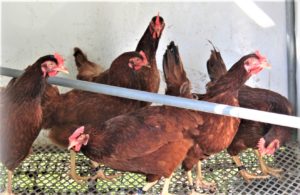West Nile Virus
What does Lee County Mosquito Control District do to reduce the risk of West Nile virus, St. Louis Encephalitis and Eastern Equine Encephalitis?
Lee County Mosquito Control has a proactive, year round mosquito-borne disease surveillance program. It is the only program in Florida able to test for mosquito borne disease in a multi-pronged approach. The program is made up of four parts. The first part is sentinel chicken surveillance. This portion uses the appearance of mosquito-borne disease in chickens strategically placed around the county to monitor the transmission of disease among the disease’s reservoir host, birds. The second part of the program is specialized adult mosquito trapping. This trapping is performed with CDC light traps to monitor the level of the vector mosquito, Culex nigripalpus. The third part is the analysis of the collected vector mosquito using RT_PCR to detect the presence of viral RNA. This data indicates the presence of infected or potentially infected mosquitoes. The final part is human investigation. Human case investigation involves determining when and where a disease was contracted. The disease contraction could be outside the neighborhood of the victim or outside the country. When a mosquito borne disease is detected in a sentinel chicken, mosquito or human the District responds immediately to control adult mosquitoes in the vicinity of the disease detection to try and prevent the further spread of the disease by mosquitoes.
 The blood samples collected from the chickens will be spun down in a centrifuge. The sera is then tested using the Enzyme-linked ImmunoSorbent Assay also known as the ELISA method. The mosquitoes will be ground down and tested to determine if the mosquitoes have picked up a mosquito borne disease.
The blood samples collected from the chickens will be spun down in a centrifuge. The sera is then tested using the Enzyme-linked ImmunoSorbent Assay also known as the ELISA method. The mosquitoes will be ground down and tested to determine if the mosquitoes have picked up a mosquito borne disease.
For an informational fact sheet on West Nile virus from the IFAS, University of Florida,
Florida Medical Entomology Laboratory click on http://edis.ifas.ufl.edu/in117
For information from the Center for Disease Control on West Nile virus go to: http://www.cdc.gov/ncidod/dvbid/westnile/index.htm
Florida Department of Health
For a map of mosquito borne disease activity in Florida click on: http://www.doh.state.fl.us/Environment/medicine/arboviral/surveillance.htm
Don’t Depend on Bats to control West Nile virus. For the full story, click here.
Drain and Cover For Preventing Mosquito Bites
- Drain – Standing water to stop mosquitoes from multiplying
- Drain water from Garbage cans, house cutters, buckets, pool covers , coolers, toys, flower pots, or any other containers where sprinkler or rain water has collected
- Discard old tires, drums, bottles, cans, pots and pans, broken appliances, and other items that aren’t being use.
- Empty and clean birdbaths and pet water dishes at least once or twice a week
- Protect boats and vehicles from rain with tarps that don’t accumulate water.
- Maintain swimming pools in good condition with proper chlorination, empty plastic swimming pools when not it use.
- Cover – skin with clothing or repellent
- Wear clothing to protect skin from bites
- Use a Mosquito Repellent – to protect children under 2 months old use mosquito netting.
- Cover doors and windows with screens to keep mosquitoes out of the house, repair broken screens on windows, doors, patios, porches.
For more information call Lee County Mosquito Control District at
239-694-2174 or visit lcmcd.com
